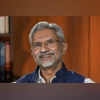Boosting India's domestic manufacturing and the overall economy will provide much more resources in its foreign policy toolkit to expand the country's influence globally and compete with China on the economic front, External Affairs Minister S Jaishankar has said.
In an exclusive interview to PTI, Jaishankar said India under the leadership of Prime Minister Narendra Modi has been focusing on enhancing domestic manufacturing in the last 10 years as there was a neglect of the sector before 2014 that created many problems for the country.
He also suggested that lack of focus in the past on the manufacturing sector is linked to the upward trajectory in India-China trade notwithstanding New Delhi's approach that normalisation of ties with Beijing is dependent on resolution of the eastern Ladakh border row.
"We need to be confident. I am clear that international politics, international relations are competitive. I have a neighbour like China. I have to learn to compete," he said.
"By my complaining, China is not going to stop doing things. If I do not build up my strength at home, our foreign policy will be as good as our domestic policy," Jaishankar said.
Also Read
"It is a function of our domestic policy that if I can actually build up my economy, if I can build up my manufacturing, if I can create the kind of capabilities which today I am trying to do, I think you are going to find the foreign policy has much more resources and much more tool in its toolkit to actually influence the world," he added.
His response came to a query on why India's bilateral trade volume with China is going up when New Delhi has been insisting that the ties cannot be normal if the border situation is abnormal.
Jaishankar suggested that such a scenario has arisen as adequate attention to the manufacturing sector was not given before 2014 in the country.
The Indian and Chinese militaries have been locked in a standoff in eastern Ladakh since May 2020 and a full resolution of the border row has not yet been achieved though the two sides have disengaged from a number of friction points.
"I think it is common sense that If there is no peace and tranquility in the border, how can you have a normal relationship," Jaishankar said.
"After all if somebody is at your front door in an unfriendly manner, you are not going to go out there and act as though everything is normal. That to me is a straightforward proposition," he said.
India has been consistently maintaining that peace and tranquillity along the Line of Actual Control (LAC) were key for normalisation of overall ties. However, trade between the two countries is steadily expanding, especially with rising imports from China.
Since the beginning of the last decade, bilateral trade between India and China recorded significant growth.
From 2015 to 2022, India-China bilateral trade grew by 90.14 per cent, an average yearly growth of 12.87 per cent. In 2022, the overall trade with China increased by 8.47 per cent year on year to reach USD 136.26 billion, crossing the USD 100 billion mark for the second time in a row, according to official data.
However, the trade deficit came to USD 101.28 billion as India's imports from China witnessed a major increase.
In the last few years, the government has been making efforts to expand manufacturing in a number of critical areas as part of an aim to de-risking from China.
There has also been a greater focus on India acquiring critical technologies to minimise import dependency.
"When you talk about trade, what has happened is in many ways, the fact that we actually neglected manufacturing in this country. That in many ways, we did not give the kind of support to our manufacturers, especially our small and medium enterprises," Jaishankar said.
The external affairs minister listed various initiatives rolled out by the Modi government including the 'Make in India' and 'Production Linked Incentive' (PLI) schemes to enhance domestic manufacturing
"In fact when Make in India was started, you have people who even laughed at it. Even now there are people like Rahul Gandhi who believe that we are incapable of manufacturing in this country and there are some economists who also have that kind of view," he said.
"So, the fact that our manufacturing fell behind, I think, has created many of the problems that we are experiencing today. You cannot get an immediate fix, but what you can do, which we have been trying to do is actually to boost manufacturing," he said.
Jaishankar said the government is rapidly modernising infrastructure and making it as efficient as possible as "without efficient infrastructure, you are not going to get competitive manufacturing."
"You know 10 years ago, how the environment was used as an argument to make business very difficult in this country," he said.
Referring to the overall development trajectory of the country, Jaishankar said he was more optimistic than ever about India's future.
"I am much more optimistic for our country than I have been all my life -- part of it is because I also see the abilities and talent of younger people; what they can do, the kind of achievements they made," he said.
On India navigating various challenges, Jaishankar said PM Modi inculcates a very strong team spirit and that various ministries in the government are now much "less siloed".
"He encourages people to work together in a much more coordinated fashion," Jaishankar said.

)
